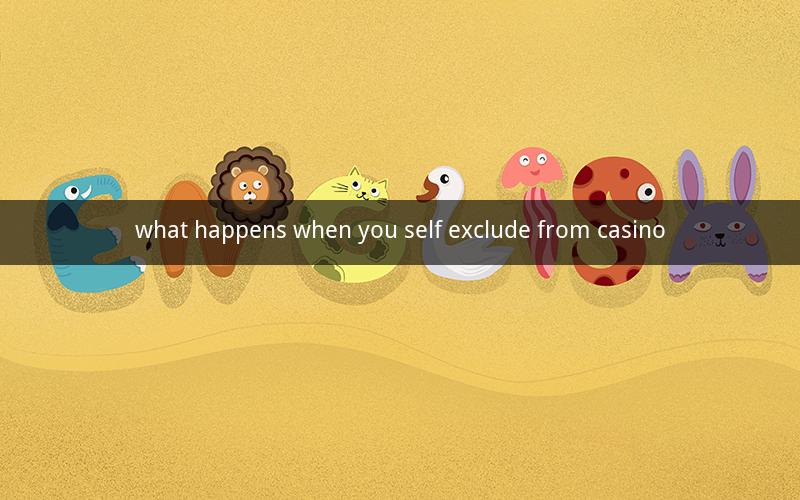
Table of Contents
1. Understanding Self-Exclusion
2. Reasons for Self-Exclusion
3. The Process of Self-Exclusion
4. The Impact of Self-Exclusion on Personal Life
5. Support and Resources for Individuals Excluded from Casinos
6. The Legal and Ethical Aspects of Self-Exclusion
7. The Role of Casinos in Implementing Self-Exclusion
8. The Long-Term Effects of Self-Exclusion
9. The Challenges of Self-Exclusion
10. The Success Stories of Self-Exclusion
---
1. Understanding Self-Exclusion
Self-exclusion from casinos is a formal process where an individual chooses to ban themselves from entering casinos for a specified period of time. It is a voluntary action that is designed to assist individuals who struggle with gambling addiction. Self-exclusion aims to prevent individuals from accessing casinos and potentially relapsing into harmful gambling behaviors.
2. Reasons for Self-Exclusion
There are various reasons why individuals might choose to self-exclude from casinos. Common reasons include:
- A desire to break a gambling habit
- Concerns about personal finances
- Emotional or psychological stress
- A history of unsuccessful attempts to stop gambling
3. The Process of Self-Exclusion
The process of self-exclusion varies by country and jurisdiction. Generally, individuals must complete a self-exclusion form, which may require them to provide personal information such as their name, address, and identification. They must then sign the form and return it to a designated authority or the casino itself. Once the form is processed, the individual is banned from all casinos within the jurisdiction for the specified period.
4. The Impact of Self-Exclusion on Personal Life
Self-exclusion can have a significant impact on an individual's personal life. On one hand, it can help individuals gain control over their gambling addiction and improve their financial and emotional well-being. On the other hand, it may lead to social isolation and a sense of loss, as individuals are unable to engage in activities that were previously a part of their social life.
5. Support and Resources for Individuals Excluded from Casinos
Several support and resources are available to individuals who have self-excluded from casinos. These include:
- Counseling services
- Support groups
- Financial assistance
- Legal advice
6. The Legal and Ethical Aspects of Self-Exclusion
The legal and ethical aspects of self-exclusion are complex. On one hand, self-exclusion is a voluntary process that respects an individual's right to make informed decisions about their own well-being. On the other hand, there is a concern that self-exclusion may infringe upon the individual's right to engage in lawful activities and access public spaces.
7. The Role of Casinos in Implementing Self-Exclusion
Casinos play a crucial role in implementing self-exclusion. They must take reasonable steps to ensure that excluded individuals are not allowed entry, such as checking identification and verifying self-exclusion records. Casinos must also provide information about self-exclusion to customers and make the process as accessible as possible.
8. The Long-Term Effects of Self-Exclusion
The long-term effects of self-exclusion are still being studied. However, some evidence suggests that self-exclusion can be an effective tool for preventing relapse and reducing gambling-related harm. Long-term success depends on the individual's ability to maintain self-discipline and access necessary support.
9. The Challenges of Self-Exclusion
Despite the benefits of self-exclusion, there are several challenges that individuals may face. These include:
- The temptation to visit casinos during the exclusion period
- Social pressure to engage in gambling activities
- The difficulty of maintaining a sense of normalcy without visiting casinos
10. The Success Stories of Self-Exclusion
There are numerous success stories of individuals who have successfully self-excluded from casinos and overcome their gambling addiction. These stories demonstrate the potential of self-exclusion as a tool for change and recovery.
---
Questions and Answers
1. What is the primary goal of self-exclusion from casinos?
- The primary goal of self-exclusion is to assist individuals with gambling addiction by preventing them from accessing casinos and potentially relapsing into harmful gambling behaviors.
2. Can self-exclusion be lifted before the specified period ends?
- Yes, self-exclusion can be lifted before the specified period ends by submitting a formal request to the designated authority or the casino.
3. How can individuals seek support while self-excluded from casinos?
- Individuals can seek support through counseling services, support groups, financial assistance, and legal advice, which are available both in-person and online.
4. What is the legal basis for self-exclusion from casinos?
- The legal basis for self-exclusion varies by country and jurisdiction but generally involves gambling laws and regulations that allow for the voluntary exclusion of individuals from casinos.
5. Can self-exclusion affect an individual's ability to enter other venues?
- Self-exclusion from casinos typically does not affect an individual's ability to enter other venues, as long as those venues are not specifically prohibited by the self-exclusion agreement.
6. What is the role of family members in supporting an individual's self-exclusion?
- Family members can support an individual's self-exclusion by offering emotional support, helping to maintain a structured routine, and encouraging participation in alternative activities.
7. Is self-exclusion confidential?
- Yes, self-exclusion is confidential, and individuals' personal information is protected under privacy laws and regulations.
8. How long does self-exclusion typically last?
- The duration of self-exclusion varies by jurisdiction, but it is typically one to five years, with the option to extend the period if needed.
9. Can individuals with a history of self-exclusion apply for self-exclusion again?
- Yes, individuals with a history of self-exclusion can apply for self-exclusion again, provided they meet the necessary requirements and the process is initiated in the same manner as the initial self-exclusion.
10. What happens if an excluded individual attempts to enter a casino during the exclusion period?
- If an excluded individual attempts to enter a casino during the exclusion period, the casino is required to deny entry and may take additional measures to prevent future violations of the self-exclusion agreement.